Knowledge Management and Organizational Learning: An Essay Analysis
VerifiedAdded on 2020/06/05
|9
|2424
|116
Essay
AI Summary
This essay delves into the critical role of knowledge management and organizational learning within business environments. It defines knowledge management as the effective utilization of information to achieve organizational goals and emphasizes its contribution to employee performance and competitive advantage. The essay explores the relevance of organizational learning and knowledge management, highlighting their impact on innovation, employee morale, and productivity. It further examines the reasons for facilitating organizational learning, focusing on the responsibilities of human resource professionals in fostering a learning culture. The essay outlines actions that facilitate organizational learning, such as encouraging challenges, supporting failures, and providing resources. It concludes by summarizing the key aspects of knowledge management and its significance in driving organizational success, emphasizing the role of HR in building a learning culture through effective communication, opportunity awareness, and employee support. The essay highlights the importance of creating, sharing, and manipulating information to achieve better organizational outcomes.
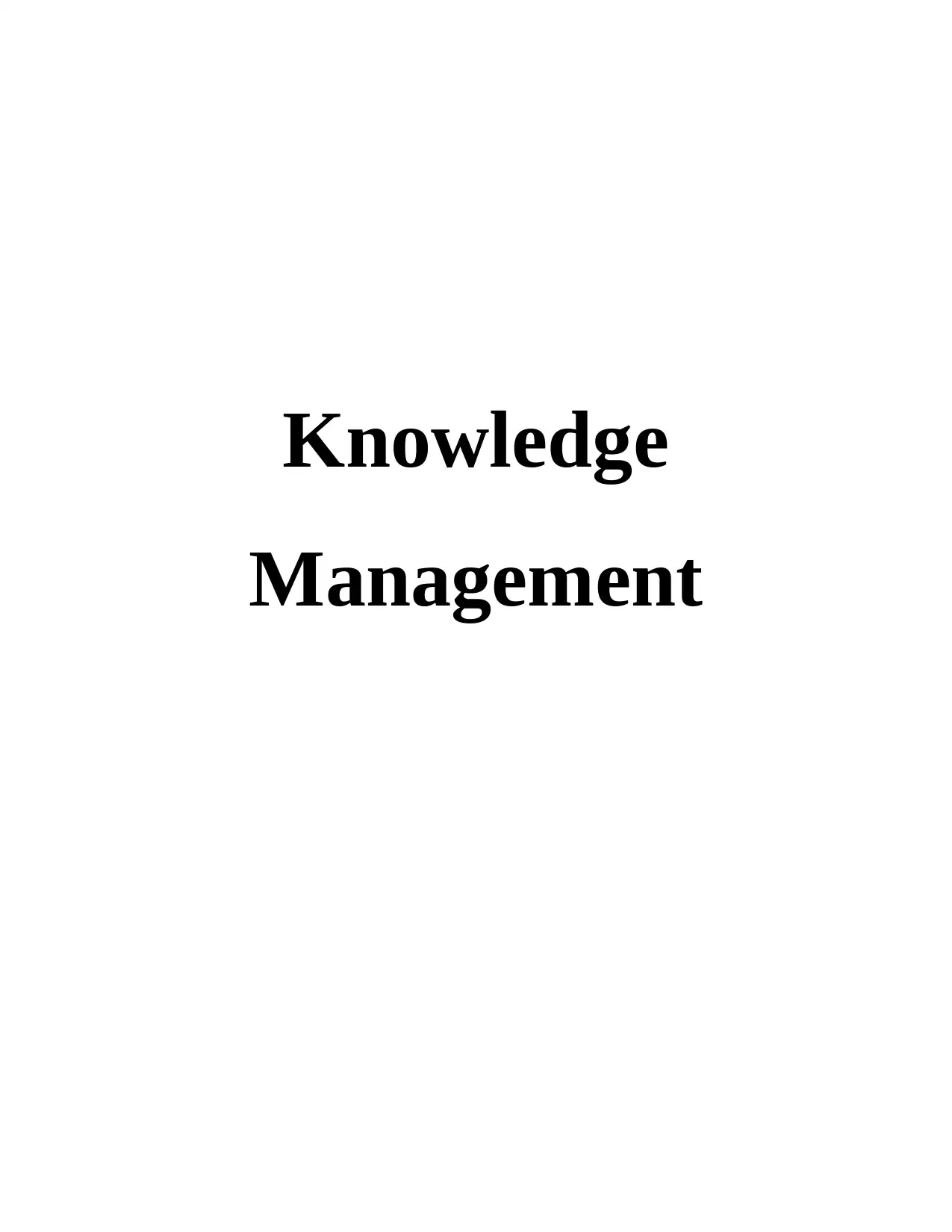
Knowledge
Management
Management
Paraphrase This Document
Need a fresh take? Get an instant paraphrase of this document with our AI Paraphraser
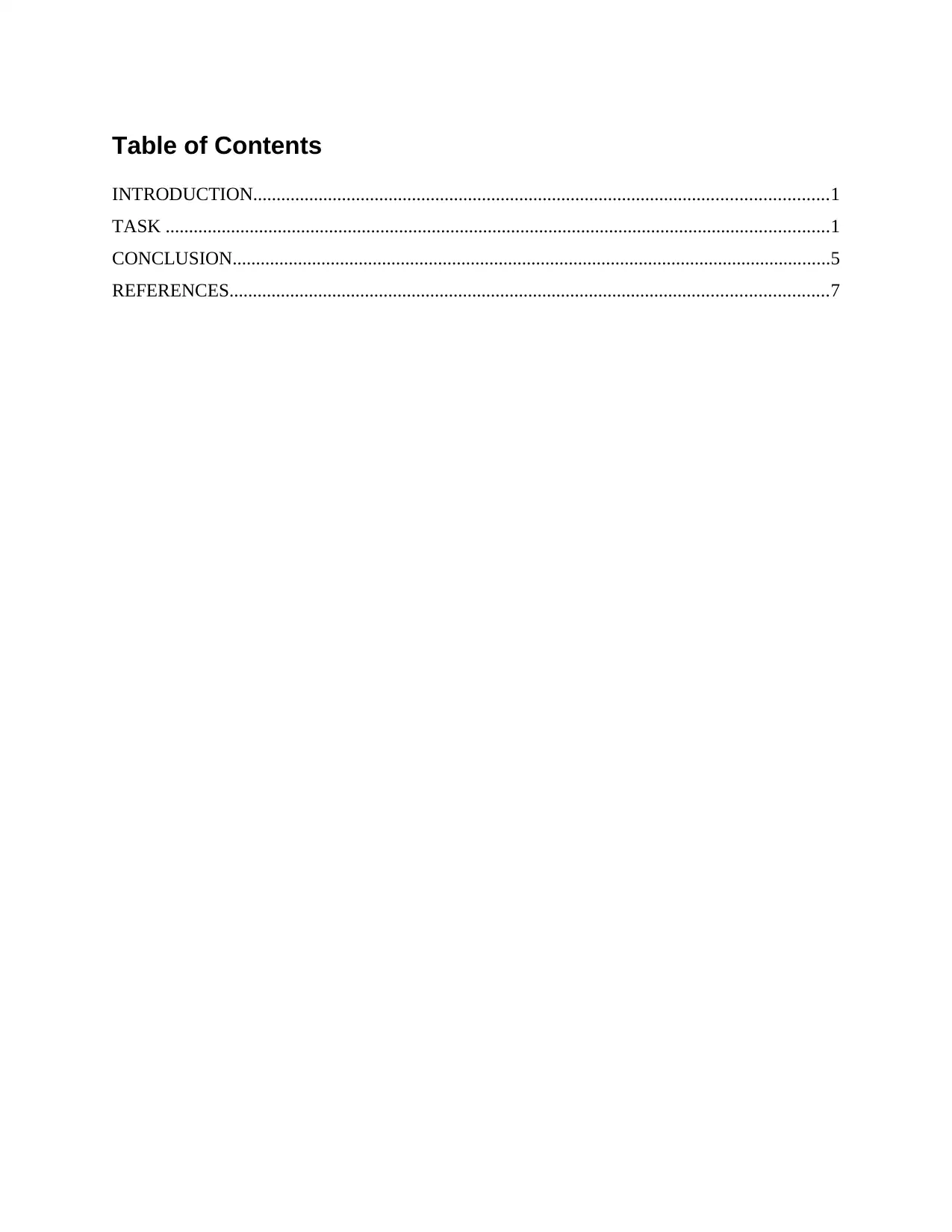
Table of Contents
INTRODUCTION...........................................................................................................................1
TASK ..............................................................................................................................................1
CONCLUSION................................................................................................................................5
REFERENCES................................................................................................................................7
INTRODUCTION...........................................................................................................................1
TASK ..............................................................................................................................................1
CONCLUSION................................................................................................................................5
REFERENCES................................................................................................................................7
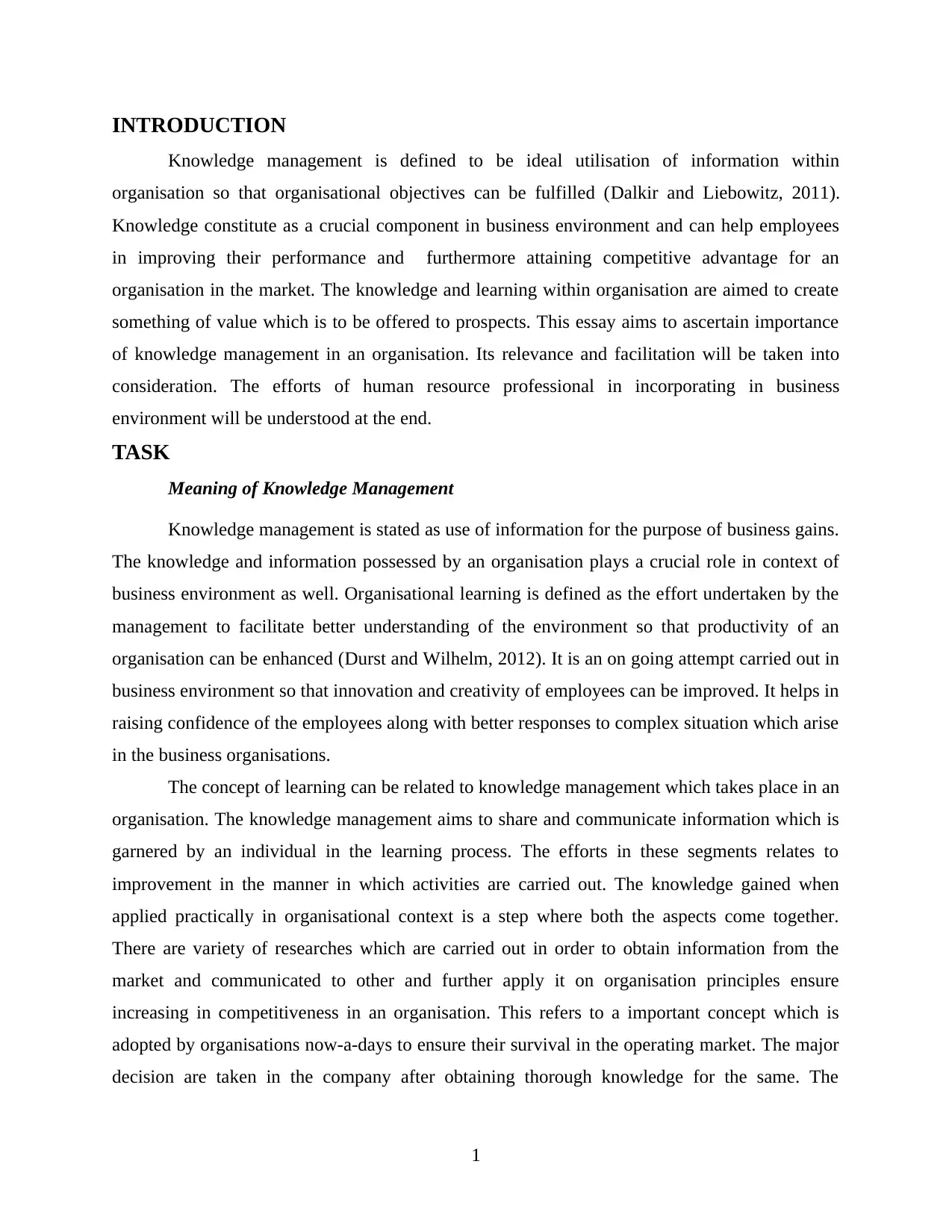
INTRODUCTION
Knowledge management is defined to be ideal utilisation of information within
organisation so that organisational objectives can be fulfilled (Dalkir and Liebowitz, 2011).
Knowledge constitute as a crucial component in business environment and can help employees
in improving their performance and furthermore attaining competitive advantage for an
organisation in the market. The knowledge and learning within organisation are aimed to create
something of value which is to be offered to prospects. This essay aims to ascertain importance
of knowledge management in an organisation. Its relevance and facilitation will be taken into
consideration. The efforts of human resource professional in incorporating in business
environment will be understood at the end.
TASK
Meaning of Knowledge Management
Knowledge management is stated as use of information for the purpose of business gains.
The knowledge and information possessed by an organisation plays a crucial role in context of
business environment as well. Organisational learning is defined as the effort undertaken by the
management to facilitate better understanding of the environment so that productivity of an
organisation can be enhanced (Durst and Wilhelm, 2012). It is an on going attempt carried out in
business environment so that innovation and creativity of employees can be improved. It helps in
raising confidence of the employees along with better responses to complex situation which arise
in the business organisations.
The concept of learning can be related to knowledge management which takes place in an
organisation. The knowledge management aims to share and communicate information which is
garnered by an individual in the learning process. The efforts in these segments relates to
improvement in the manner in which activities are carried out. The knowledge gained when
applied practically in organisational context is a step where both the aspects come together.
There are variety of researches which are carried out in order to obtain information from the
market and communicated to other and further apply it on organisation principles ensure
increasing in competitiveness in an organisation. This refers to a important concept which is
adopted by organisations now-a-days to ensure their survival in the operating market. The major
decision are taken in the company after obtaining thorough knowledge for the same. The
1
Knowledge management is defined to be ideal utilisation of information within
organisation so that organisational objectives can be fulfilled (Dalkir and Liebowitz, 2011).
Knowledge constitute as a crucial component in business environment and can help employees
in improving their performance and furthermore attaining competitive advantage for an
organisation in the market. The knowledge and learning within organisation are aimed to create
something of value which is to be offered to prospects. This essay aims to ascertain importance
of knowledge management in an organisation. Its relevance and facilitation will be taken into
consideration. The efforts of human resource professional in incorporating in business
environment will be understood at the end.
TASK
Meaning of Knowledge Management
Knowledge management is stated as use of information for the purpose of business gains.
The knowledge and information possessed by an organisation plays a crucial role in context of
business environment as well. Organisational learning is defined as the effort undertaken by the
management to facilitate better understanding of the environment so that productivity of an
organisation can be enhanced (Durst and Wilhelm, 2012). It is an on going attempt carried out in
business environment so that innovation and creativity of employees can be improved. It helps in
raising confidence of the employees along with better responses to complex situation which arise
in the business organisations.
The concept of learning can be related to knowledge management which takes place in an
organisation. The knowledge management aims to share and communicate information which is
garnered by an individual in the learning process. The efforts in these segments relates to
improvement in the manner in which activities are carried out. The knowledge gained when
applied practically in organisational context is a step where both the aspects come together.
There are variety of researches which are carried out in order to obtain information from the
market and communicated to other and further apply it on organisation principles ensure
increasing in competitiveness in an organisation. This refers to a important concept which is
adopted by organisations now-a-days to ensure their survival in the operating market. The major
decision are taken in the company after obtaining thorough knowledge for the same. The
1
⊘ This is a preview!⊘
Do you want full access?
Subscribe today to unlock all pages.

Trusted by 1+ million students worldwide
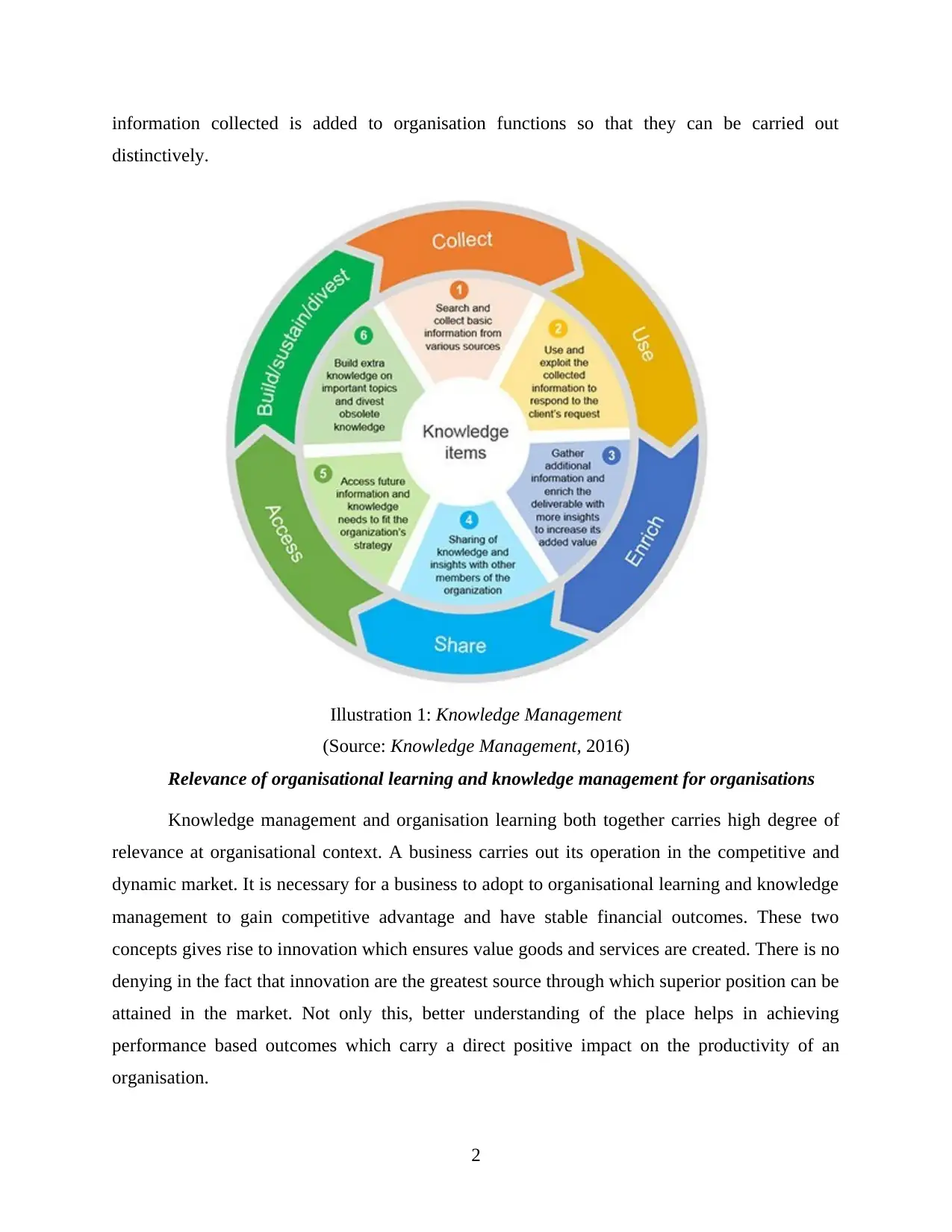
information collected is added to organisation functions so that they can be carried out
distinctively.
(Source: Knowledge Management, 2016)
Relevance of organisational learning and knowledge management for organisations
Knowledge management and organisation learning both together carries high degree of
relevance at organisational context. A business carries out its operation in the competitive and
dynamic market. It is necessary for a business to adopt to organisational learning and knowledge
management to gain competitive advantage and have stable financial outcomes. These two
concepts gives rise to innovation which ensures value goods and services are created. There is no
denying in the fact that innovation are the greatest source through which superior position can be
attained in the market. Not only this, better understanding of the place helps in achieving
performance based outcomes which carry a direct positive impact on the productivity of an
organisation.
2
Illustration 1: Knowledge Management
distinctively.
(Source: Knowledge Management, 2016)
Relevance of organisational learning and knowledge management for organisations
Knowledge management and organisation learning both together carries high degree of
relevance at organisational context. A business carries out its operation in the competitive and
dynamic market. It is necessary for a business to adopt to organisational learning and knowledge
management to gain competitive advantage and have stable financial outcomes. These two
concepts gives rise to innovation which ensures value goods and services are created. There is no
denying in the fact that innovation are the greatest source through which superior position can be
attained in the market. Not only this, better understanding of the place helps in achieving
performance based outcomes which carry a direct positive impact on the productivity of an
organisation.
2
Illustration 1: Knowledge Management
Paraphrase This Document
Need a fresh take? Get an instant paraphrase of this document with our AI Paraphraser
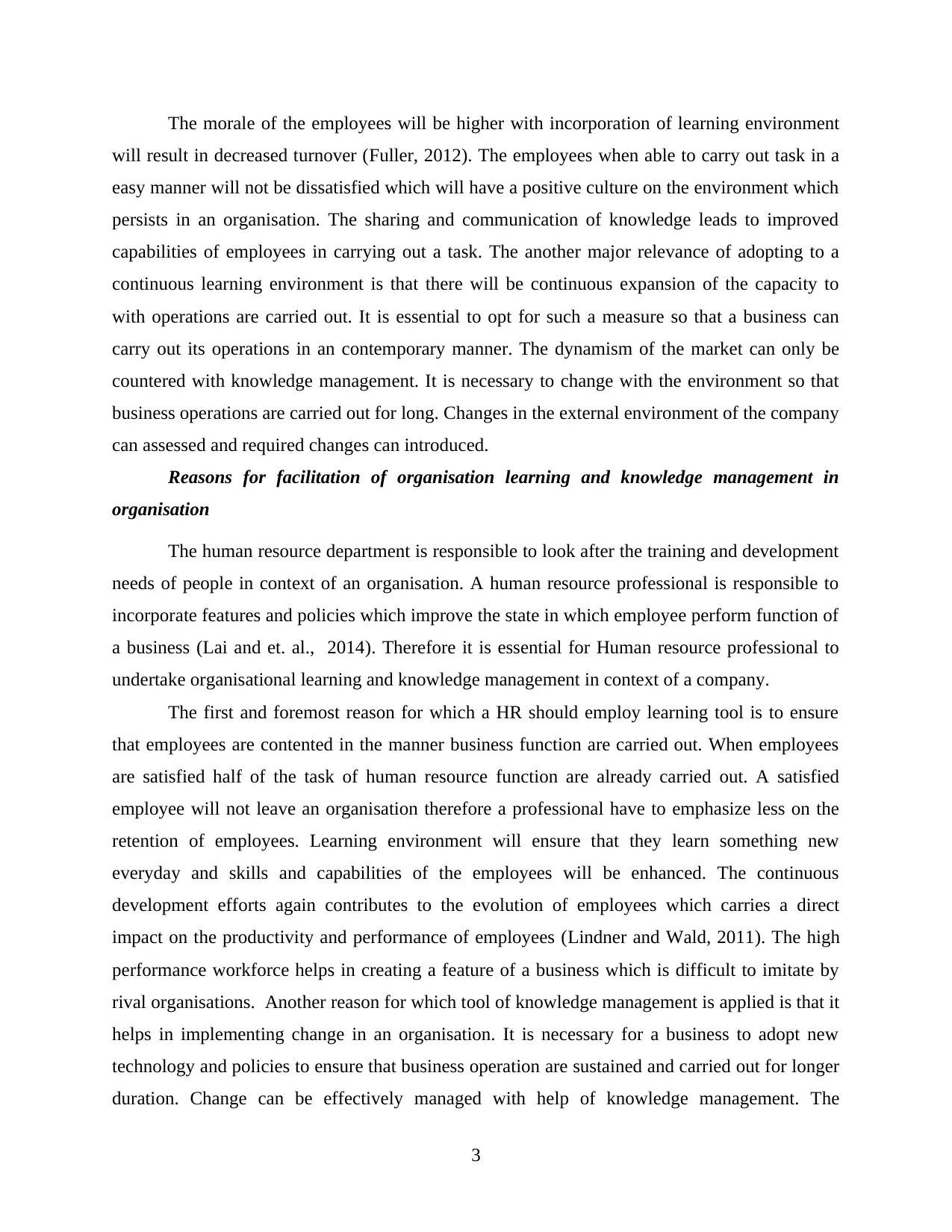
The morale of the employees will be higher with incorporation of learning environment
will result in decreased turnover (Fuller, 2012). The employees when able to carry out task in a
easy manner will not be dissatisfied which will have a positive culture on the environment which
persists in an organisation. The sharing and communication of knowledge leads to improved
capabilities of employees in carrying out a task. The another major relevance of adopting to a
continuous learning environment is that there will be continuous expansion of the capacity to
with operations are carried out. It is essential to opt for such a measure so that a business can
carry out its operations in an contemporary manner. The dynamism of the market can only be
countered with knowledge management. It is necessary to change with the environment so that
business operations are carried out for long. Changes in the external environment of the company
can assessed and required changes can introduced.
Reasons for facilitation of organisation learning and knowledge management in
organisation
The human resource department is responsible to look after the training and development
needs of people in context of an organisation. A human resource professional is responsible to
incorporate features and policies which improve the state in which employee perform function of
a business (Lai and et. al., 2014). Therefore it is essential for Human resource professional to
undertake organisational learning and knowledge management in context of a company.
The first and foremost reason for which a HR should employ learning tool is to ensure
that employees are contented in the manner business function are carried out. When employees
are satisfied half of the task of human resource function are already carried out. A satisfied
employee will not leave an organisation therefore a professional have to emphasize less on the
retention of employees. Learning environment will ensure that they learn something new
everyday and skills and capabilities of the employees will be enhanced. The continuous
development efforts again contributes to the evolution of employees which carries a direct
impact on the productivity and performance of employees (Lindner and Wald, 2011). The high
performance workforce helps in creating a feature of a business which is difficult to imitate by
rival organisations. Another reason for which tool of knowledge management is applied is that it
helps in implementing change in an organisation. It is necessary for a business to adopt new
technology and policies to ensure that business operation are sustained and carried out for longer
duration. Change can be effectively managed with help of knowledge management. The
3
will result in decreased turnover (Fuller, 2012). The employees when able to carry out task in a
easy manner will not be dissatisfied which will have a positive culture on the environment which
persists in an organisation. The sharing and communication of knowledge leads to improved
capabilities of employees in carrying out a task. The another major relevance of adopting to a
continuous learning environment is that there will be continuous expansion of the capacity to
with operations are carried out. It is essential to opt for such a measure so that a business can
carry out its operations in an contemporary manner. The dynamism of the market can only be
countered with knowledge management. It is necessary to change with the environment so that
business operations are carried out for long. Changes in the external environment of the company
can assessed and required changes can introduced.
Reasons for facilitation of organisation learning and knowledge management in
organisation
The human resource department is responsible to look after the training and development
needs of people in context of an organisation. A human resource professional is responsible to
incorporate features and policies which improve the state in which employee perform function of
a business (Lai and et. al., 2014). Therefore it is essential for Human resource professional to
undertake organisational learning and knowledge management in context of a company.
The first and foremost reason for which a HR should employ learning tool is to ensure
that employees are contented in the manner business function are carried out. When employees
are satisfied half of the task of human resource function are already carried out. A satisfied
employee will not leave an organisation therefore a professional have to emphasize less on the
retention of employees. Learning environment will ensure that they learn something new
everyday and skills and capabilities of the employees will be enhanced. The continuous
development efforts again contributes to the evolution of employees which carries a direct
impact on the productivity and performance of employees (Lindner and Wald, 2011). The high
performance workforce helps in creating a feature of a business which is difficult to imitate by
rival organisations. Another reason for which tool of knowledge management is applied is that it
helps in implementing change in an organisation. It is necessary for a business to adopt new
technology and policies to ensure that business operation are sustained and carried out for longer
duration. Change can be effectively managed with help of knowledge management. The
3
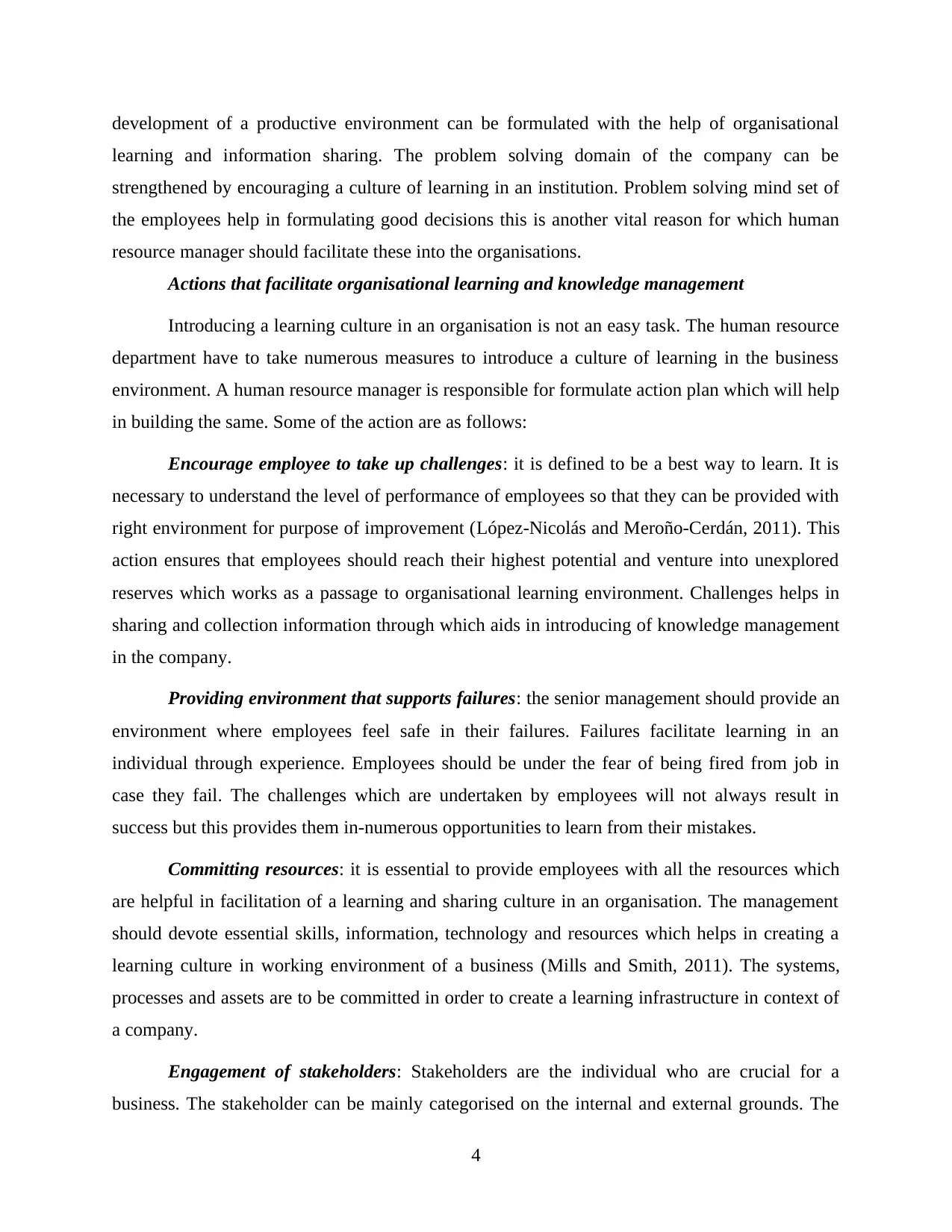
development of a productive environment can be formulated with the help of organisational
learning and information sharing. The problem solving domain of the company can be
strengthened by encouraging a culture of learning in an institution. Problem solving mind set of
the employees help in formulating good decisions this is another vital reason for which human
resource manager should facilitate these into the organisations.
Actions that facilitate organisational learning and knowledge management
Introducing a learning culture in an organisation is not an easy task. The human resource
department have to take numerous measures to introduce a culture of learning in the business
environment. A human resource manager is responsible for formulate action plan which will help
in building the same. Some of the action are as follows:
Encourage employee to take up challenges: it is defined to be a best way to learn. It is
necessary to understand the level of performance of employees so that they can be provided with
right environment for purpose of improvement (López-Nicolás and Meroño-Cerdán, 2011). This
action ensures that employees should reach their highest potential and venture into unexplored
reserves which works as a passage to organisational learning environment. Challenges helps in
sharing and collection information through which aids in introducing of knowledge management
in the company.
Providing environment that supports failures: the senior management should provide an
environment where employees feel safe in their failures. Failures facilitate learning in an
individual through experience. Employees should be under the fear of being fired from job in
case they fail. The challenges which are undertaken by employees will not always result in
success but this provides them in-numerous opportunities to learn from their mistakes.
Committing resources: it is essential to provide employees with all the resources which
are helpful in facilitation of a learning and sharing culture in an organisation. The management
should devote essential skills, information, technology and resources which helps in creating a
learning culture in working environment of a business (Mills and Smith, 2011). The systems,
processes and assets are to be committed in order to create a learning infrastructure in context of
a company.
Engagement of stakeholders: Stakeholders are the individual who are crucial for a
business. The stakeholder can be mainly categorised on the internal and external grounds. The
4
learning and information sharing. The problem solving domain of the company can be
strengthened by encouraging a culture of learning in an institution. Problem solving mind set of
the employees help in formulating good decisions this is another vital reason for which human
resource manager should facilitate these into the organisations.
Actions that facilitate organisational learning and knowledge management
Introducing a learning culture in an organisation is not an easy task. The human resource
department have to take numerous measures to introduce a culture of learning in the business
environment. A human resource manager is responsible for formulate action plan which will help
in building the same. Some of the action are as follows:
Encourage employee to take up challenges: it is defined to be a best way to learn. It is
necessary to understand the level of performance of employees so that they can be provided with
right environment for purpose of improvement (López-Nicolás and Meroño-Cerdán, 2011). This
action ensures that employees should reach their highest potential and venture into unexplored
reserves which works as a passage to organisational learning environment. Challenges helps in
sharing and collection information through which aids in introducing of knowledge management
in the company.
Providing environment that supports failures: the senior management should provide an
environment where employees feel safe in their failures. Failures facilitate learning in an
individual through experience. Employees should be under the fear of being fired from job in
case they fail. The challenges which are undertaken by employees will not always result in
success but this provides them in-numerous opportunities to learn from their mistakes.
Committing resources: it is essential to provide employees with all the resources which
are helpful in facilitation of a learning and sharing culture in an organisation. The management
should devote essential skills, information, technology and resources which helps in creating a
learning culture in working environment of a business (Mills and Smith, 2011). The systems,
processes and assets are to be committed in order to create a learning infrastructure in context of
a company.
Engagement of stakeholders: Stakeholders are the individual who are crucial for a
business. The stakeholder can be mainly categorised on the internal and external grounds. The
4
⊘ This is a preview!⊘
Do you want full access?
Subscribe today to unlock all pages.

Trusted by 1+ million students worldwide
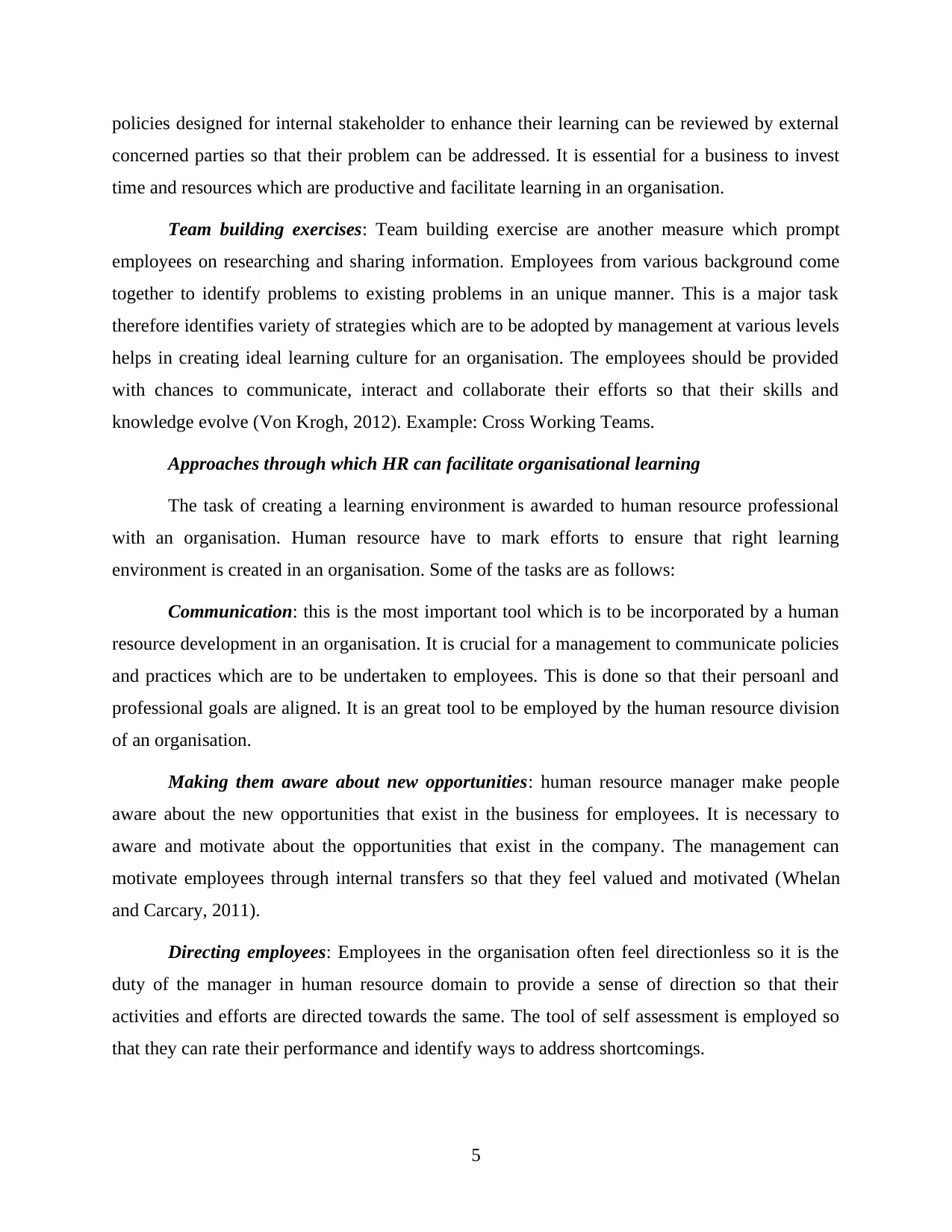
policies designed for internal stakeholder to enhance their learning can be reviewed by external
concerned parties so that their problem can be addressed. It is essential for a business to invest
time and resources which are productive and facilitate learning in an organisation.
Team building exercises: Team building exercise are another measure which prompt
employees on researching and sharing information. Employees from various background come
together to identify problems to existing problems in an unique manner. This is a major task
therefore identifies variety of strategies which are to be adopted by management at various levels
helps in creating ideal learning culture for an organisation. The employees should be provided
with chances to communicate, interact and collaborate their efforts so that their skills and
knowledge evolve (Von Krogh, 2012). Example: Cross Working Teams.
Approaches through which HR can facilitate organisational learning
The task of creating a learning environment is awarded to human resource professional
with an organisation. Human resource have to mark efforts to ensure that right learning
environment is created in an organisation. Some of the tasks are as follows:
Communication: this is the most important tool which is to be incorporated by a human
resource development in an organisation. It is crucial for a management to communicate policies
and practices which are to be undertaken to employees. This is done so that their persoanl and
professional goals are aligned. It is an great tool to be employed by the human resource division
of an organisation.
Making them aware about new opportunities: human resource manager make people
aware about the new opportunities that exist in the business for employees. It is necessary to
aware and motivate about the opportunities that exist in the company. The management can
motivate employees through internal transfers so that they feel valued and motivated (Whelan
and Carcary, 2011).
Directing employees: Employees in the organisation often feel directionless so it is the
duty of the manager in human resource domain to provide a sense of direction so that their
activities and efforts are directed towards the same. The tool of self assessment is employed so
that they can rate their performance and identify ways to address shortcomings.
5
concerned parties so that their problem can be addressed. It is essential for a business to invest
time and resources which are productive and facilitate learning in an organisation.
Team building exercises: Team building exercise are another measure which prompt
employees on researching and sharing information. Employees from various background come
together to identify problems to existing problems in an unique manner. This is a major task
therefore identifies variety of strategies which are to be adopted by management at various levels
helps in creating ideal learning culture for an organisation. The employees should be provided
with chances to communicate, interact and collaborate their efforts so that their skills and
knowledge evolve (Von Krogh, 2012). Example: Cross Working Teams.
Approaches through which HR can facilitate organisational learning
The task of creating a learning environment is awarded to human resource professional
with an organisation. Human resource have to mark efforts to ensure that right learning
environment is created in an organisation. Some of the tasks are as follows:
Communication: this is the most important tool which is to be incorporated by a human
resource development in an organisation. It is crucial for a management to communicate policies
and practices which are to be undertaken to employees. This is done so that their persoanl and
professional goals are aligned. It is an great tool to be employed by the human resource division
of an organisation.
Making them aware about new opportunities: human resource manager make people
aware about the new opportunities that exist in the business for employees. It is necessary to
aware and motivate about the opportunities that exist in the company. The management can
motivate employees through internal transfers so that they feel valued and motivated (Whelan
and Carcary, 2011).
Directing employees: Employees in the organisation often feel directionless so it is the
duty of the manager in human resource domain to provide a sense of direction so that their
activities and efforts are directed towards the same. The tool of self assessment is employed so
that they can rate their performance and identify ways to address shortcomings.
5
Paraphrase This Document
Need a fresh take? Get an instant paraphrase of this document with our AI Paraphraser
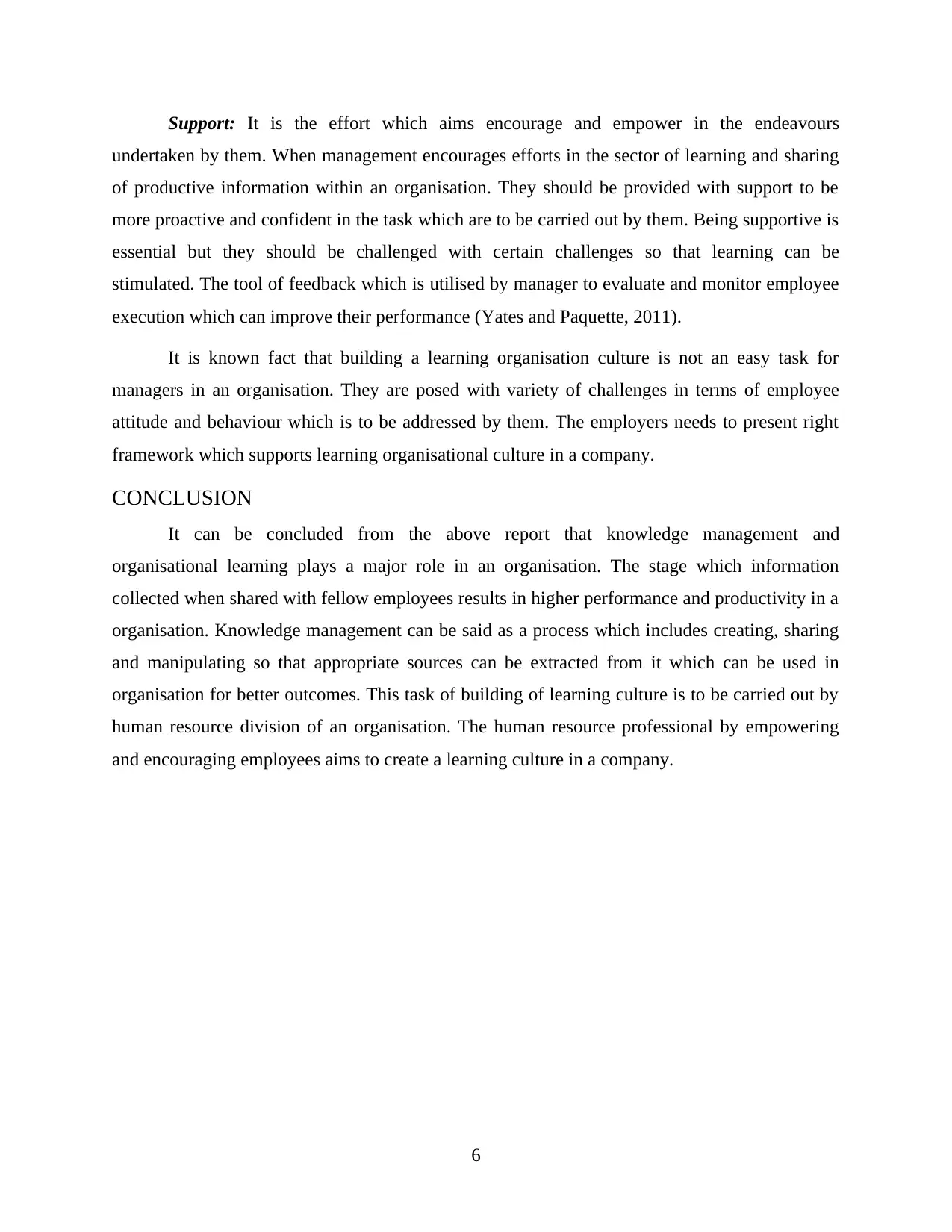
Support: It is the effort which aims encourage and empower in the endeavours
undertaken by them. When management encourages efforts in the sector of learning and sharing
of productive information within an organisation. They should be provided with support to be
more proactive and confident in the task which are to be carried out by them. Being supportive is
essential but they should be challenged with certain challenges so that learning can be
stimulated. The tool of feedback which is utilised by manager to evaluate and monitor employee
execution which can improve their performance (Yates and Paquette, 2011).
It is known fact that building a learning organisation culture is not an easy task for
managers in an organisation. They are posed with variety of challenges in terms of employee
attitude and behaviour which is to be addressed by them. The employers needs to present right
framework which supports learning organisational culture in a company.
CONCLUSION
It can be concluded from the above report that knowledge management and
organisational learning plays a major role in an organisation. The stage which information
collected when shared with fellow employees results in higher performance and productivity in a
organisation. Knowledge management can be said as a process which includes creating, sharing
and manipulating so that appropriate sources can be extracted from it which can be used in
organisation for better outcomes. This task of building of learning culture is to be carried out by
human resource division of an organisation. The human resource professional by empowering
and encouraging employees aims to create a learning culture in a company.
6
undertaken by them. When management encourages efforts in the sector of learning and sharing
of productive information within an organisation. They should be provided with support to be
more proactive and confident in the task which are to be carried out by them. Being supportive is
essential but they should be challenged with certain challenges so that learning can be
stimulated. The tool of feedback which is utilised by manager to evaluate and monitor employee
execution which can improve their performance (Yates and Paquette, 2011).
It is known fact that building a learning organisation culture is not an easy task for
managers in an organisation. They are posed with variety of challenges in terms of employee
attitude and behaviour which is to be addressed by them. The employers needs to present right
framework which supports learning organisational culture in a company.
CONCLUSION
It can be concluded from the above report that knowledge management and
organisational learning plays a major role in an organisation. The stage which information
collected when shared with fellow employees results in higher performance and productivity in a
organisation. Knowledge management can be said as a process which includes creating, sharing
and manipulating so that appropriate sources can be extracted from it which can be used in
organisation for better outcomes. This task of building of learning culture is to be carried out by
human resource division of an organisation. The human resource professional by empowering
and encouraging employees aims to create a learning culture in a company.
6
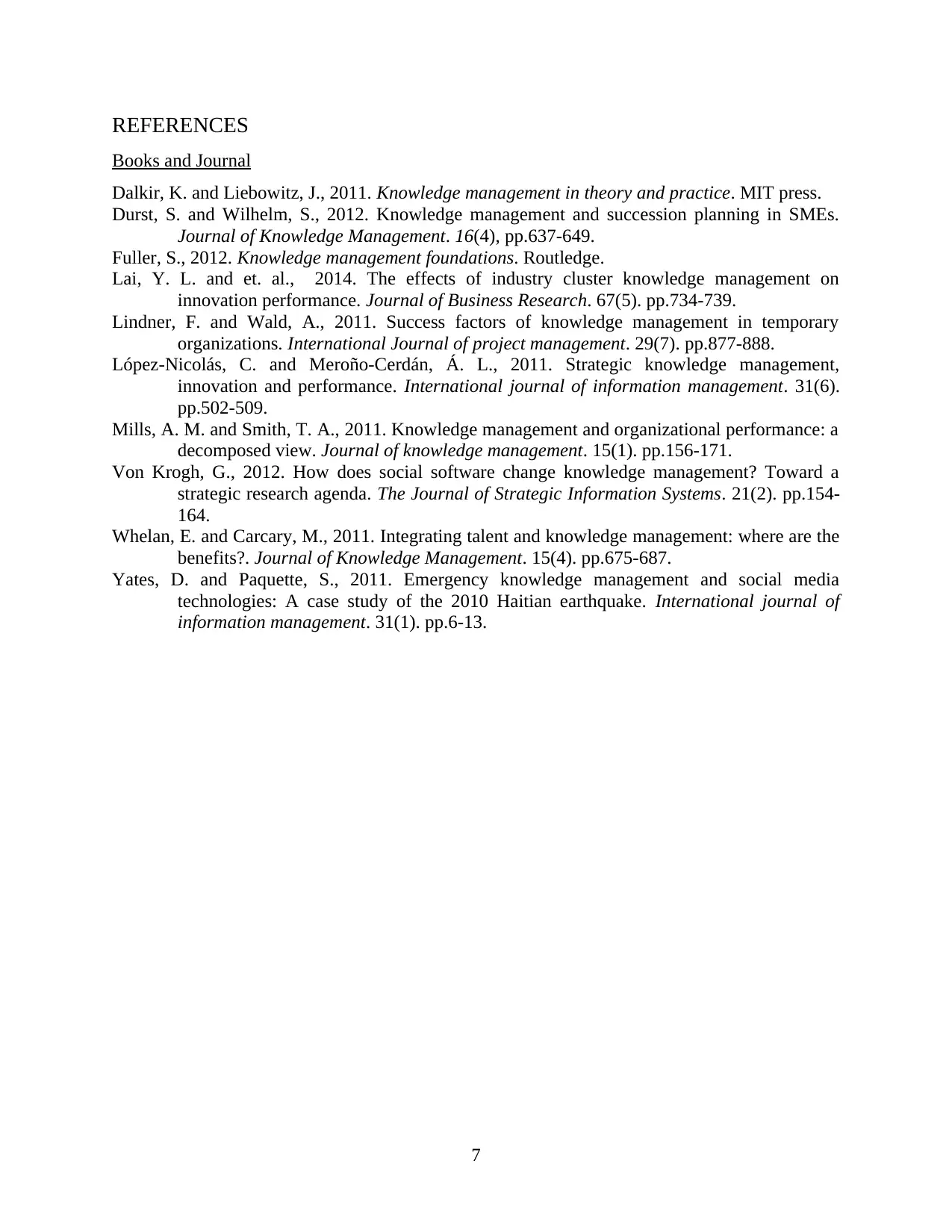
REFERENCES
Books and Journal
Dalkir, K. and Liebowitz, J., 2011. Knowledge management in theory and practice. MIT press.
Durst, S. and Wilhelm, S., 2012. Knowledge management and succession planning in SMEs.
Journal of Knowledge Management. 16(4), pp.637-649.
Fuller, S., 2012. Knowledge management foundations. Routledge.
Lai, Y. L. and et. al., 2014. The effects of industry cluster knowledge management on
innovation performance. Journal of Business Research. 67(5). pp.734-739.
Lindner, F. and Wald, A., 2011. Success factors of knowledge management in temporary
organizations. International Journal of project management. 29(7). pp.877-888.
López-Nicolás, C. and Meroño-Cerdán, Á. L., 2011. Strategic knowledge management,
innovation and performance. International journal of information management. 31(6).
pp.502-509.
Mills, A. M. and Smith, T. A., 2011. Knowledge management and organizational performance: a
decomposed view. Journal of knowledge management. 15(1). pp.156-171.
Von Krogh, G., 2012. How does social software change knowledge management? Toward a
strategic research agenda. The Journal of Strategic Information Systems. 21(2). pp.154-
164.
Whelan, E. and Carcary, M., 2011. Integrating talent and knowledge management: where are the
benefits?. Journal of Knowledge Management. 15(4). pp.675-687.
Yates, D. and Paquette, S., 2011. Emergency knowledge management and social media
technologies: A case study of the 2010 Haitian earthquake. International journal of
information management. 31(1). pp.6-13.
7
Books and Journal
Dalkir, K. and Liebowitz, J., 2011. Knowledge management in theory and practice. MIT press.
Durst, S. and Wilhelm, S., 2012. Knowledge management and succession planning in SMEs.
Journal of Knowledge Management. 16(4), pp.637-649.
Fuller, S., 2012. Knowledge management foundations. Routledge.
Lai, Y. L. and et. al., 2014. The effects of industry cluster knowledge management on
innovation performance. Journal of Business Research. 67(5). pp.734-739.
Lindner, F. and Wald, A., 2011. Success factors of knowledge management in temporary
organizations. International Journal of project management. 29(7). pp.877-888.
López-Nicolás, C. and Meroño-Cerdán, Á. L., 2011. Strategic knowledge management,
innovation and performance. International journal of information management. 31(6).
pp.502-509.
Mills, A. M. and Smith, T. A., 2011. Knowledge management and organizational performance: a
decomposed view. Journal of knowledge management. 15(1). pp.156-171.
Von Krogh, G., 2012. How does social software change knowledge management? Toward a
strategic research agenda. The Journal of Strategic Information Systems. 21(2). pp.154-
164.
Whelan, E. and Carcary, M., 2011. Integrating talent and knowledge management: where are the
benefits?. Journal of Knowledge Management. 15(4). pp.675-687.
Yates, D. and Paquette, S., 2011. Emergency knowledge management and social media
technologies: A case study of the 2010 Haitian earthquake. International journal of
information management. 31(1). pp.6-13.
7
⊘ This is a preview!⊘
Do you want full access?
Subscribe today to unlock all pages.

Trusted by 1+ million students worldwide
1 out of 9
Related Documents
Your All-in-One AI-Powered Toolkit for Academic Success.
+13062052269
info@desklib.com
Available 24*7 on WhatsApp / Email
![[object Object]](/_next/static/media/star-bottom.7253800d.svg)
Unlock your academic potential
Copyright © 2020–2025 A2Z Services. All Rights Reserved. Developed and managed by ZUCOL.





